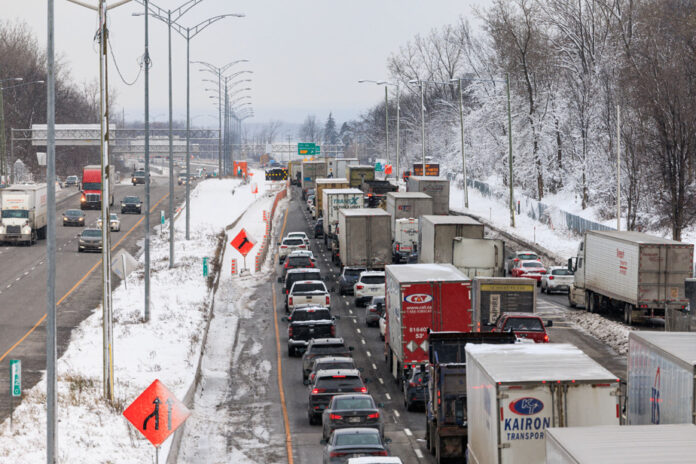Delays, detours and unforeseen bills… the loss of another lane on the Île-aux-Tourtes bridge for “six to eight weeks” is a new challenge for trucking companies, which were already struggling to enter and exit the island of Montreal.
The industry is already used to plans B because of the multiplication of road obstacles in the four corners of the metropolis. However, the restriction in force since December 1 on the structure linking Montreal to Vaudreuil-Dorion quickly had repercussions for certain carriers. There is only one lane in each direction.
“Some of our drivers usually have time to make the round trip between Montreal and the Toronto area in the same day,” says Alexandra Bieganska, manager of human resources, safety and compliance at Nour Transport. On Tuesday, one of our drivers got stuck in Pincourt because he lost too much time in traffic. He had reached the maximum number of hours he could drive in a day. »
Result: the specialist in refrigerated semi-trailer transport had to send another driver to take over to complete the journey and offer the stranded driver a vehicle to return home.
In the evening, Monday, a traffic jam of approximately eight kilometers, in which there were dozens of trucks, paralyzed traffic heading west (to leave Montreal), noted La Presse.
“It has improved slightly [traffic] since then, but these are additional expenses (mileage and fuel) for us,” says Ms. Bieganska. We mobilize another person and we waste time. Traveling back and forth between Montreal and Toronto in the same day is becoming more and more difficult for our drivers. »
According to the most recent data available from the Ministry of Transport of Quebec (MTQ), nearly 87,000 vehicles, including some 10,000 trucks, use the Île-aux-Tourtes bridge daily in both directions. Inaugurated in 1965, the structure is reaching the end of its useful life and has been accumulating structural problems for several years.
The most recent track removal on the structure is added to other restrictions – such as the repair of the Louis-Hippolyte-La Fontaine tunnel and the maintenance work on the Mercier Bridge – which complicate comings and goings in Montreal. On Wednesday, the office of the Minister of Transport and Sustainable Mobility, Geneviève Guilbault, announced that the current situation was expected to last for “six to eight weeks”.
Few options are available to truckers who usually use the Île-aux-Tourtes bridge: be patient in traffic jams, take a detour via Autoroute 30 – for which the toll is free – or turn towards Autoroute 20, which becomes an urban boulevard near Vaudreuil-Dorion.
“When it’s not this bridge that’s closed, it’s the others,” jokes Trans-West’s vice-president of sales, Pascal Gaudet. It is reality. »
The Lachine-based company, whose trucks travel back and forth to the west coast of the United States to transport refrigerated products, believes it has flexibility since it specializes in longer distance journeys. It can plan the departures and arrivals of its heavy goods vehicles outside of peak hours, which it tries to do as much as possible, says Mr. Gaudet.
Other companies do not have this latitude. One of the “good clients” of Groupe Lafrance, whose headquarters is located on rue Notre-Dame Est, is located in Vaudreuil.
“I have no choice but to go over that bridge [de l’Île-aux-Tourtes], explains its president, Daniel Bineau. If I want to take the 30, I have to take the tunnel, where it’s not any better. These are delays and additional costs that customers sometimes have difficulty understanding. It’s difficult to try to justify overloads because the MTQ closes lanes on a bridge. Our customer in Vaudreuil doesn’t want to receive anything because they close at 3 p.m. The delivery window is reduced. »
It’s a “tough passage,” recognizes the president and CEO of the Quebec Trucking Association (ACQ), Marc Cadieux. On Monday, everything suggests that the first snowfall made things worse, he said.
The effects on delivery times are inevitable, according to Mr. Cadieux.
“It is possible that several drivers will be caught up with the hours of service caps and that they will be forced to stop driving to rest before arriving at their destination,” believes the ACQ leader.
The latter hopes that the industry will have a little respite during the holiday period, when there are usually fewer “regular road users for a few weeks”.















